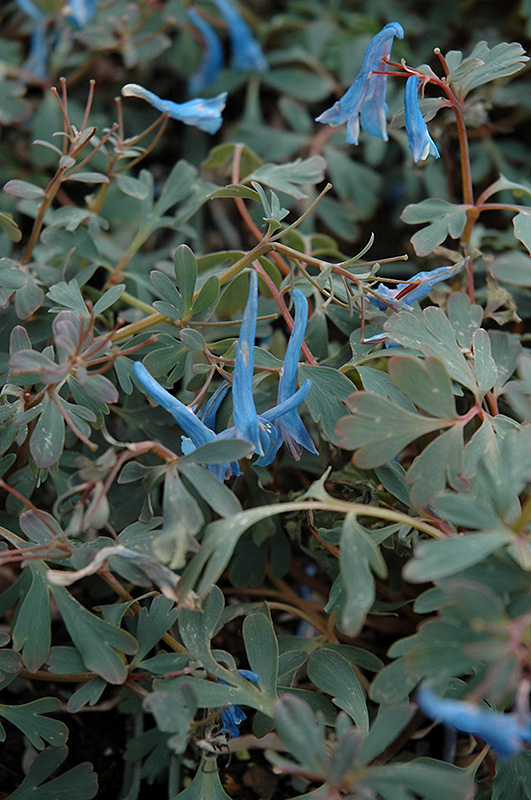Height: 12 inches
Spread: 12 inches
Sunlight:
![]()
![]()
Hardiness Zone: 6b
Other Names: Fumitory
Description:
Incredible fragrant sky-blue trumpet flowers rise above mounds of blue-green foliage; new introduction; you have to see the color to believe how beautiful it is
Ornamental Features
Blue Heron Corydalis has masses of beautiful spikes of fragrant sky blue trumpet-shaped flowers with shell pink overtones rising above the foliage from mid spring to late summer, which are most effective when planted in groupings. The flowers are excellent for cutting. Its ferny compound leaves emerge burgundy in spring, turning bluish-green in color the rest of the year.
Landscape Attributes
Blue Heron Corydalis is a dense herbaceous evergreen perennial with a mounded form. It brings an extremely fine and delicate texture to the garden composition and should be used to full effect.
This is a relatively low maintenance plant, and should only be pruned after flowering to avoid removing any of the current season's flowers. Deer don't particularly care for this plant and will usually leave it alone in favor of tastier treats. It has no significant negative characteristics.
Blue Heron Corydalis is recommended for the following landscape applications;
- Rock/Alpine Gardens
- Border Edging
- General Garden Use
- Naturalizing And Woodland Gardens
- Container Planting
Planting & Growing
Blue Heron Corydalis will grow to be about 12 inches tall at maturity, with a spread of 12 inches. Its foliage tends to remain dense right to the ground, not requiring facer plants in front. It grows at a medium rate, and under ideal conditions can be expected to live for approximately 5 years. As an evegreen perennial, this plant will typically keep its form and foliage year-round. As this plant tends to go dormant in summer, it is best interplanted with late-season bloomers to hide the dying foliage.
This plant does best in full sun to partial shade. It prefers to grow in average to moist conditions, and shouldn't be allowed to dry out. It is not particular as to soil type or pH. It is quite intolerant of urban pollution, therefore inner city or urban streetside plantings are best avoided, and will benefit from being planted in a relatively sheltered location. Consider applying a thick mulch around the root zone in both summer and winter to conserve soil moisture and protect it in exposed locations or colder microclimates. This particular variety is an interspecific hybrid. It can be propagated by division; however, as a cultivated variety, be aware that it may be subject to certain restrictions or prohibitions on propagation.
Blue Heron Corydalis is a fine choice for the garden, but it is also a good selection for planting in outdoor pots and containers. It is often used as a 'filler' in the 'spiller-thriller-filler' container combination, providing a mass of flowers against which the thriller plants stand out. Note that when growing plants in outdoor containers and baskets, they may require more frequent waterings than they would in the yard or garden.
